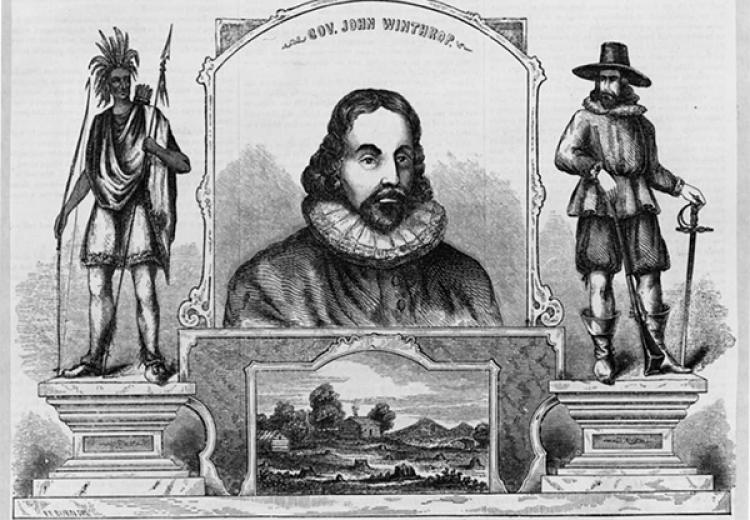Colonizing the Bay

Portrait of Gov. John Winthrop, flanked by statues of a Native American (left) and a pilgrim.
John Winthrop’s “Model of Christian Charity” was delivered as a sermon aboard the Arabella, as the Puritans approached their destination of Massachusetts Bay in 1630. It is a powerful speech outlining some key tenets of the Puritans’ beliefs, as well as Winthrop’s ideas of what the Puritans needed to do to build a successful community in the land they were entering. The speech, often referred to by its “City upon a Hill” metaphor, spells out his vision of the society they hoped to create and how they must act if they were to succeed in the eyes of God. The sermon sought to inspire and to motivate the Puritans by pointing out the distance between an ideal community and their real-world situation. It is a speech that American political leaders still quote.
Why would a large number of English people leave their country and homes for a destination far across the Atlantic Ocean? From 1630 to 1641, approximately 13,000 Puritans left England for New England – WHY? They followed the migration of the Pilgrims, who arrived in 1620, and an advance party of Puritans who went to Salem in 1629. But the first mass exodus occurred in 1630, when Governor John Winthrop led a fleet of ships from England to found the Massachusetts Bay Colony. King Charles I issued a charter to the Massachusetts Bay Company that would serve as the colony’s constitution, in other words, its framework of government.
This lesson focuses on the content of Winthrop’s speech and how it illuminates the Puritans’ beliefs, goals, and programs. It requires a close reading of a difficult text – but one that yields significant benefits to those who persist and analyze it closely.
Guiding Questions
What does John Winthrop’s “Model of Christian Charity” sermon explain about the beliefs and goals of the Puritans?
What type of society did he hope to create and how?
What were the consequences of the Puritan society created under Winthrop?
Learning Objectives
Explain John Winthrop’s goals in his “Model of Christian Charity” speech.
Evaluate whether Winthrop appealed more to Puritans’ hopes or to their fears.
Predict the possibilities for success and failure in the Massachusetts Bay Colony and provide evidence from the speech to support their answer.
Explain why Winthrop predicted the Puritans’ new society would be “a city upon a hill” and why that metaphor is still important today.
